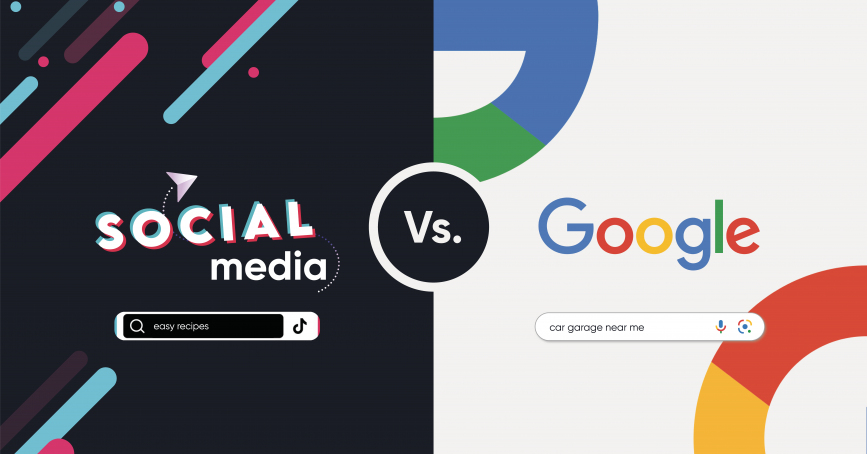
Insights Social Media v Google: The shift in search

According to those in the know, I’m supposedly Gen Z but I can assure you that I still remember the days of cassette tapes and waiting ten minutes for our desktop computer to load up! But when talking to colleagues about the different generations, it got me thinking about how, as technology has changed, the way people search for information or recommendations might have changed too.
While Google is no doubt still the top dog when it comes to search engines, and normally the go-to option when researching something for most of us, it’s not uncommon for many to now turn to social media in place of this. A recent study by Forbes Advisor and Talker Research found that Gen Z are more likely (46%) to use platforms such as TikTok or Instagram as their first port of call, whereas Millennials were less inclined (35%).
The study also found that Gen Z predominantly use TikTok or Instagram when on the hunt for new clothing and fashion brands (36% and 27% respectively) – recipes/food recommendations were also high up on the list. Google is very much still the go-to for electronics research and local services, like garages, cleaners etc.
While this is not entirely surprising, with Gen Z predominantly having grown up with social media, more so than any other generation, Google has even flagged that they are aware of this shift as a potential threat.
So what does this mean for you?
Well, like I said, Google is not going anywhere anytime soon. But this does on the other hand show that social media is very much increasingly becoming more important as a search option. Something you’ll need to consider when creating content is who are you creating it for. If you’re trying to target C-suit then it’s likely they will still find you via Google and other search engines, whereas if Gen Z or possibly Millennials are your target audience, you’ll need to ensure your social media strategy bears this in mind.
One trend we’ve noticed is how often content creators have started putting keywords and phrases at the bottom of their captions (different to hashtags) in a way to capture people searching for specific content and terms, very much like how we would sprinkle the same keywords and phrases within insights etc on a webpage.
What this shift to social media for search does show is a broader change in user behaviour and expectations. Younger generations, especially Gen Z, are used to the immediacy and visual appeal of platforms like TikTok and Instagram. They often prefer bite-sized, engaging content over traditional, lengthy articles. Unsurprisingly, this impacts how brands and businesses approach their content strategies. It's no longer enough to have a well-optimised website; a strong, active presence on social media platforms is crucial.
The interactive nature of social media allows for real-time engagement. Users can ask questions, leave comments, and share their experiences, creating a dynamic dialogue between brands and their audiences. This interaction fosters a sense of community and trust, which is harder to achieve through traditional search engines.
While Google remains an integral part of search, the rise of social media as a search platform cannot (and should not) be ignored. Brands need to adapt their content strategies to meet the changing habits of younger generations. By understanding where and how different audiences search, you can better tailor their content to ensure it reaches the right people in the right places. Embracing this shift will enhance visibility, but also build stronger connections with consumers in a digitally evolving landscape which is always a good thing.
Share insight
Let's talk
- Call us +44 (0) 1256 334567
If you would like to find out more about how we can help you connect strategically, creatively or digitally, then call us or get in touch. We’d love to hear from you.













